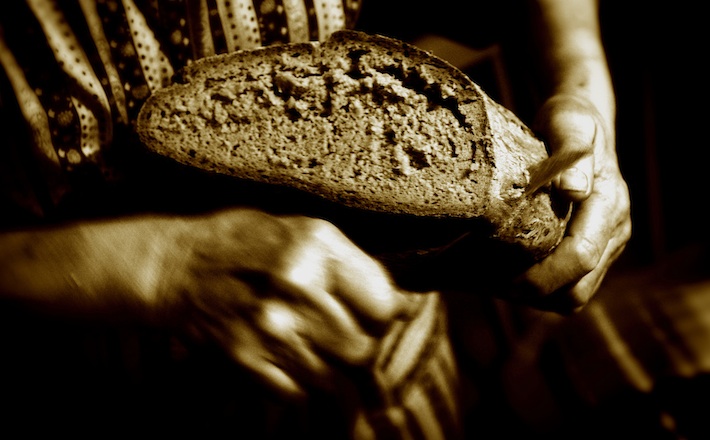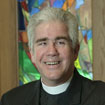Commentary on John 6:24-35
The hymn powerfully portrays the plight of so many of God’s children: “Across the world, across the street, the victims of injustice cry for shelter and for bread to eat, and never live before they die” (Evangelical Lutheran Worship #729).
And never live before they die. The reality becomes all the more poignant when I allow myself to linger on and ponder the word children. How many kids go hungry in the world and in our nation, in your community and even your congregation? With the crowd chasing after Jesus, I want a sign that God is doing something new — that human-created circumstances and conditions cannot undermine or negate.
As someone familiar with how Bible stories end, I am sometimes impatient with the crowd chasing after Jesus. How can people bother Jesus for another round of loaves and fishes, when Jesus is going to serve up his very life on a cross to draw all people to himself and take away our sin and the sin of the world? With Jesus, I find myself thinking, “Do not work for the food that perishes, but for the food that endures for eternal life, which the Son of Humanity will give you” (John 6:27).
Then I contemplate this story through the realities of our world. As long lines for humanitarian aid demonstrate, eating your fill one day does not mean that you will not be hungry the next. When there is no food, and you do not know how you will sustain your life today, what is the point of working for eternity? Think parents whisking their children out of their beds in Egypt — or Central America — on the promise of a better life, only to watch their kids starve to death (or get blown to bits) in the desert.
Some things are worth complaining to God about. Sometimes, asking God for assurance that God is still with us is understandable, even appropriate. When Jesus answered, “Very truly, I tell you, you are looking for me, not because you saw signs, but because you ate your fill of the loaves” (John 6:26), I do not think Jesus was scolding the crowd for seeking bread because they were hungry. I think Jesus was disappointed that the crowd did not expect more, not more bread but something more. Perhaps Jesus was thinking more about ending hunger than serving up more bread. Moses and Aaron, not to mention God, may have been disappointed that Israel did not expect more, not an Egyptian deli in the desert, but that the God who delivered them from slavery would also sustain them in the desert.
This is easy to see and even easier to say because we know the end of God’s story, for us and for the world, as well as for the people in the Bible — manna, quail, promised land; suffering, death, resurrection; water, word, table; abundant and eternal life. So why don’t we expect more from God? Why do we settle for signs of God’s grace — bread from whatever source — rather than seeking and expecting God’s immortal love for us? Could it be that we work for the food that perishes, rather than the food that endures for eternal life, which the Son of Humanity gives us, because we are unwilling or unable to name what we truly hunger for and seek? Why do you suppose this is? Fear of being disappointed, a need to somehow protect God, and clarity that we are not deserving all come to mind.
And why do we assume that we have to work to get what we truly hunger for and seek? With the crowd, we assume that the key question when we encounter God is, “What must we do to perform the works of God?” (John 6:28) Along with, “How much is enough?” and “How do we make sure we do it right?” These questions press even harder when the stakes are war and peace, safety and security, food, water, and health care, the economy and the environment. “What must we do to perform the works of God?”
Jesus responds to us as he did the crowd: “This is the work of God, that you believe in him whom God has sent” (John 6:29). To believe is to trust that God is doing something new that human-created conditions and circumstances cannot undermine or negate. To believe is to submit everything, even our highest-stake issues, to God’s saving work in Jesus. To believe is not so much what we do as being open to what God is doing.
Of course, being open to what God is doing and submitting everything to Jesus means we might not do what is wise, practical, advantageous, safe. In fact, being open to God and submitting everything to Jesus means that our doing is less important because we are not in charge, let alone in control.
Now if we are going to give up all control, we need some assurance, some guarantee. Perhaps we can understand the crowd asking, “What sign are you going to give us then, so that we may see it and believe you?” (John 6:30). Since the crowd is looking for a political king like David and a prophet like Moses, what better sign than manna in the wilderness? Moses gave manna to their ancestors, and their ancestors believed. But Jesus points out that God rather than Moses fed the people in the wilderness. What made the feeding a sign was not the manna, but that the manna came down from heaven. The manna was only an appetizer for the true bread that came down from heaven, Jesus, who gives life through his teaching and his flesh, because God sent Jesus.
Jesus is the bread that fulfills all our hunger and thirst. Jesus frees us to follow him not to achieve self-satisfaction, not to get anything that is in it for us, not even to attain or maintain peace of mind. Jesus frees us to embrace God’s redeeming will to restore the cosmos to what God created and humanity to what God intends. Such faith does not mean separating the spiritual out of the social. It means putting God rather than us at the center of both. When we do, we can and will expect more.


August 2, 2015